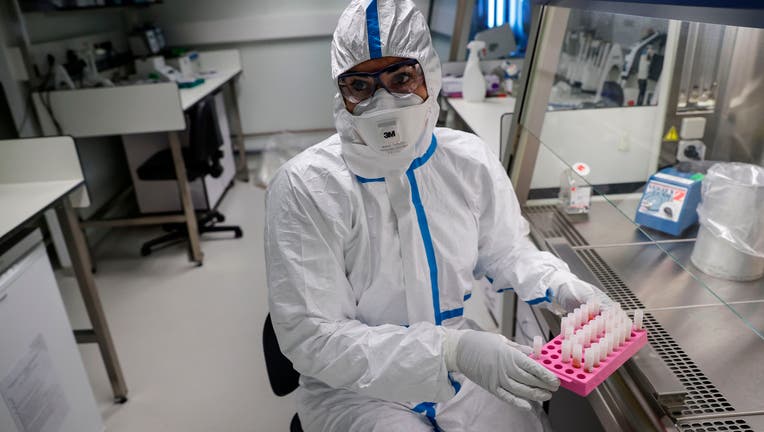19 coronavirus cases in LA County with first possible case of community transmission

A laboratory operator wearing a protective gear handles patients' samples in a laboratory of the National Reference Center (CNR) for respiratory viruses at the Institut Pasteur in Paris on January 28, 2020. (Photo by Thomas SAMSON / AFP) (Photo by TH (Getty Images)
LOS ANGELES - Long Beach officials confirmed early Monday evening the city's first three cases of coronavirus. The city, which has a health department separate from the county, says the patients are two men and one woman. This brings the overall total to 19 cases in Los Angeles County.
RELATED: Long Beach officials confirmed the city's first three cases of coronavirus
Earlier, Los Angeles County public health officials announced two additional cases within the county. One of the two cases was reportedly an individual with known travel history to Japan. The Los Angeles County Department of Public Health said that they have not been able to identify a known source of exposure for the second individual, meaning it could be the first case in the county that may have been transmitted through the community.
RELATED: The latest news stories on the coronavirus
"There are no known public exposure locations related to these cases at this time," Public Health wrote in a press release.
Both of the patients are under isolation. Dr. Barbara Ferrer, the director of Los Angeles County Department of Public Health, said health officials have identified close contacts of the patients and they too will be subject to quarantine for up to 14 days from their last exposure to a confirmed case.
RELATED: New case of COVID-19 confirmed in L.A. County; local total now at 14
Breakdown of confirmed cases in the county:
• Eight people in the travel group to Italy
• Two contract employees who were conducting coronavirus medical screenings of arriving passengers at Los Angeles International Airport
• Two relatives of a person who lives outside the county and was also confirmed with the virus
• A traveler from the area of Wuhan, China, the epicenter of the coronavirus outbreak. That person, the county's first, has since recovered
• A resident who recently returned from attending the AIPAC Conference in Washington, D.C., where there was a known exposure to a person who was positive for the virus
• A resident who recently traveled to Japan
• One case of unknown origin
• Three residents in the city of Long Beach. Two of which traveled internationally and one who traveled domestically, all to areas with known community transmission
Symptoms of COVID-19 include fever, cough and shortness of breath. Anyone who experiences these symptoms should call their healthcare provider or local public health department first before seeking medical care so that appropriate precautions can be taken.
Public health officials recommended that people with underlying health conditions, pregnant women and people who are elderly adopt some "social distancing" practices immediately. This includes avoiding non-essential travel, avoiding public gatherings and avoiding event venues.
Get breaking news alerts in the FOX 11 News app. Download for iOS or Android.
Although officials with the Centers for Disease Control and Prevention are urging residents to be prepared, they say you're still more likely to contract the flu than coronavirus.
The best ways to prevent the spread of respiratory infections, including novel coronavirus, are:
• Stay home if you are sick. Sick people make well people sick.
• If you have mild symptoms, there may be no need to go to a medical facility to see a doctor.
• Certain patients, such as the elderly, those that are immune-compromised or have underlying health conditions should call their doctor earlier.
• If you have questions, please call the clinic or your doctor before going in. If you do not have a healthcare provider, call 211 for assistance finding support near you.
• Wash your hands with soap and water for at least 20 seconds, especially after going to the bathroom; before eating; and after blowing your nose, coughing, or sneezing.
• Cover your cough or sneeze with a tissue, then throw the tissue in the trash.
• Get immunized against the flu to protect yourself and your family, and reduce the potential strain on the healthcare system, which may be impacted by COVID-19 concerns.
The CDC does not recommend people who are well to wear facemasks.

